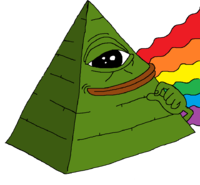Think
Lewitt, it seems like your paragraphs are less of a definition than they are an attempt at creating more concept art. If the “idea or concept is the most important part of the work,” relying on established decisions combined with whimsical execution, how can it be “involved with all types of mental processes” and still be “purposeless?” Doesn’t everything have a purpose? A professor recently told me that all art is propaganda in some way. Even in these exploratory paragraphs the goal is that we as readers should be accepting the definitionless definition of concept art. “Most ideas that are successful are ludicrously simple,” and yet concept art seems to be wrapped up in a series of highly methodical decisions intentionally made to appear complex and haphazard. You brought up a good point: “different people will understand the same thing in a different way,” and once it is out of our hands our work can be interpreted/critiqued/manipulated in any way. But this brings us back to the question of agency- am I empowered as the viewer to find meaning in something, or is the artist who spent so long on the development of an idea and method that is secretly intentional but outwardly haphazard actually disengaged from his or her own idea? Are we stuck in a cycle of conceptual art consumption and production that reduces the system to a capitalist exchange?
